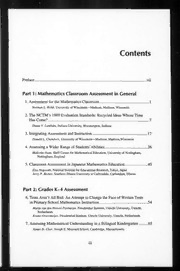
National Council of Teachers of Mathematics Yearbook 1993: Table of Contents PDF
Preview National Council of Teachers of Mathematics Yearbook 1993: Table of Contents
Contents Preface Part 1: Mathematics Classroom Assessment in General 1. Assessment for the Mathematics Classroom Norman L. Webb, University of Wisconsin—Madison, Madison, Wisconsin 2. The NCTM’s 1989 Evaluation Standards: Recycled Ideas Whose Time I -ccsicerensnicssossncnasisisiisitiensdeepialtinenderctsceniagleiiitet ditientisiintaninesaishainaeniiiaaapaalal 7 Diana V. Lambdin, Indiana University, Bloomington, Indiana 3. Integrating Assessment and Instruction Donald L. Chambers, University of Wisconsin—Madison, Madison, Wisconsin 4. Assessing a Wider Range of Students’ Abilities ..................ccssessseeeeeeeeeeeees 26 Malcolm Swan, Shell Centre for Mathematical Education, University of Nottingham, Nottingham, England 5. Classroom Assessment in Japanese Mathematics Education Eizo Nagasaki, National Institute for Educational Research, Tokyo, Japan Jerry P. Becker, Southern Illinois University at Carbondale, Carbondale, Illinois Part 2: Grades K-4 Assessment 6. Tests Aren’t All Bad: An Attempt to Change the Face of Written Tests in Primary School Mathematics Instruction Marja van den Heuvel-Panhuizen, Freudenthal Institute, Utrecht University, Utrecht, Netherlands Koeno Gravemeijer, Freudenthal Institute, Utrecht University, Utrecht, Netherlands 7. Assessing Mathematical Understanding in a Bilingual Kindergarten James St. Clair, Joseph E. Maynard School, Cambridge, Massachusetts iV 8. Assessing Measurement in the Primary Classroom Susan Sanford, Rooftop Elementary School, San Francisco, California 9. Interviews: A Window to Students’ Conceptual Knowledge of the Si ITITIIII sissies aiscsd inh ceaaipcrhieebeiaenistespeheonsesngiehhencbda ceenbeaiseniennibainssienseaeibed 80 DeAnn M. Huinker, University of Wisconsin—Milwaukee, Milwaukee, Wisconsin 10. Learning Logs: What Are They and How Do We Use Them?..................... 87 Pamela L. Carter, Waverly Community Schools, Lansing, Michigan Pamela K. Ogle, Waverly Community Schools, Lansing, Michigan Lynn B. Royer, Waverly Community Schools, Lansing, Michigan 11. A Day in the Life of an Elementary School Mathematics Classroom: Assessment in Action Larry Leutzinger, University of Northern lowa, Cedar Falls, lowa Myrna Bertheau, Shell Rock Elementary School, Shell Rock, lowa Gary Nanke, Area Education Agency 7, Cedar Falls, lowa 12. Assessment: A Means to Empower Children? ..............:.ssssssssssseeeeseseeeees 103 Ann Anderson, University of British Columbia, Vancouver, British Columbia 13. Assessing Students’ Performance Using Observations, Reflections, and Other Methods Ann Beyer, Ann Arbor Public Schools, Ann Arbor, Michigan 14. From Multiple Choice to Action and Voice: Teachers Designing a Change in Assessment for Mathematics in Grade | Jane F. Schielack, Texas A&M University, College Station, Texas Dinah Chancellor, Bryan Independent School District, Bryan, Texas Part 3: Grades 5-8 Assessment 15. Just Because They Got It Right, Does It Mean They Know It?................. 130 Susan Gay, University of Kansas, Lawrence, Kansas Margaret Thomas, Putnam City Schools, Oklahoma City, Oklahoma 16. Superitem Tests as a Classroom Assessment Tool Linda Dager Wilson, University of Wisconsin—Madison, Madison, Wisconsin Silvia Chavarria, University of Costa Rica, San José, Costa Rica 17. Facilitating Communication for Assessing Critical Thinking in Problem Solving Walter Szetela, University of British Columbia, Vancouver, British Columbia CONTENTS 18. Assessment as a Dialogue: A Means of Interacting with Middle School Ste inciinsicspincinitssenbeinicisiniiprsinstiicaceabilibsipsndieeantiiaiinnmeiiailediacaaaaid 152 Kris A. Warloe, Cheldelin Middle School, Corvallis, Oregon 19. Assessment of Statistical Analysis in Eighth Grade Maria Mastromatteo, Brown Middle School, Ravenna, Ohio Part 4: Grades 9-12 Assessment 20. Assessing Reasoning and Proof in High School Denisse R. Thompson, University of South Florida, Tampa, Florida Sharon L. Senk, Michigan State University, East Lansing, Michigan 21. A Meaningful Grading Scheme for Assessing Extended Tasks Robert Money, Department of School Education, Melbourne, Victoria, Australia Max Stephens, Department of School Education, Melbourne, Victoria, Australia 22. An Authentic Assessment of Students’ Statistical Knowledge Joan B. Garfield, University of Minnesota, Minneapolis, Minnesota 23. Assessment in Problem-oriented Curricula Jan de Lange, Freudenthal Institute, Utrecht University, Utrecht, Netherlands 24. Assessment in the Interactive Mathematics Project Lynne Alper, Project EQUALS, University of California at Berkeley, Berkeley, California Dan Fendel, San Francisco State University, San Francisco, California Sherry Fraser, Project EQUALS, University of California at Berkeley, Berkeley, California Diane Resek, San Francisco State University, San Francisco, California Part 5: Classroom Assessment Issues to Think About 25. The Classroom Assessment in Mathematics Network Maria Santos, San Francisco Unified School District, San Francisco, California Mark Driscoll, Education Development Center, Newton, Massachusetts Diane Briars, Pittsburgh Public Schools, Pittsburgh, Pennsylvania 26. Student Self-Assessment in Mathematics Patricia Ann Kenney, University of Pittsburgh, Pittsburgh, Pennsylvania Edward A. Silver, University of Pittsburgh, Pittsburgh, Pennsylvania vi CONTENTS 27. Assessment, Understanding Mathematics, and Distinguishing Visions RRS EERE SS SE ee eee er oe MOP DE Re RF oer 239 Thomas J. Cooney, University of Georgia, Athens, Georgia Elizabeth Badger, Massachusetts State Department of Education, Boston, Massachusetts Melvin R. Wilson, University of Michigan, Ann Arbor, Michigan
